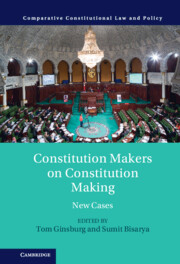Book contents
- Constitution Makers on Constitution Making
- Comparative Constitutional Law and Policy
- Constitution Makers on Constitution Making
- Copyright page
- Contents
- Contributors
- Acknowledgments
- 1 Introduction
- 2 Making and Remaking Kenya’s Constitution
- 3 Kosovo’s Independence Constitution
- 4 Decisions, Deadlocks and Deadlines in Making South Africa’s Constitution
- 5 Makers of Our Own History
- 6 Nepal’s Constitutional Development and the Challenges of Constitution Making
- 7 The Constituent Process in Ecuador
- 8 Burundi
- References
4 - Decisions, Deadlocks and Deadlines in Making South Africa’s Constitution
Published online by Cambridge University Press: 03 November 2022
- Constitution Makers on Constitution Making
- Comparative Constitutional Law and Policy
- Constitution Makers on Constitution Making
- Copyright page
- Contents
- Contributors
- Acknowledgments
- 1 Introduction
- 2 Making and Remaking Kenya’s Constitution
- 3 Kosovo’s Independence Constitution
- 4 Decisions, Deadlocks and Deadlines in Making South Africa’s Constitution
- 5 Makers of Our Own History
- 6 Nepal’s Constitutional Development and the Challenges of Constitution Making
- 7 The Constituent Process in Ecuador
- 8 Burundi
- References
Summary
South Africa’s 1996 constitution has been described as the birth certificate of a new, non-apartheid state. Following the Harare declaration in 1989, the process of ending apartheid accelerated, in which the writing of a new constitution played an important role. Throughout the process, there was gridlock involving the makeup of the constituent assembly and constitutional stipulations involving the death penalty, lockout clauses, the language of education, the appointment of judges and other issues. In the twenty-five years since the adoption of the constitution, it has proven to be a robust bulwark against infighting and instability. There are several lessons from South Africa’s constitutive process. While the constitution is best understood within the context of South Africa’s history and the ANC’s resistance to apartheid, an essential aspect of the process was that many of the disputes were settled collectively in “package deals” and through novel deadlock-breaking mechanisms.
Keywords
- Type
- Chapter
- Information
- Constitution Makers on Constitution MakingNew Cases, pp. 126 - 150Publisher: Cambridge University PressPrint publication year: 2022

